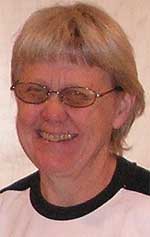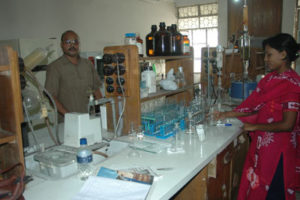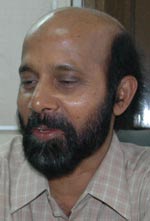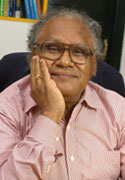![]()
Postal Address: Box 549, SE-751 21 Uppsala, Sweden
Visiting Address: Dag Hammarskjölds väg 31
Web page: http://www.isp.uu.se
Key persons:
 Associate Professor Peter Sundin (photo to the left), Head of International Science Program, and Programme Director for the International Program in Chemical Sciences, IPICS).
Associate Professor Peter Sundin (photo to the left), Head of International Science Program, and Programme Director for the International Program in Chemical Sciences, IPICS).
 Peter Sundin succeeded Malin Åkerblom (photo to the right) who was in charge of IPICS for many years, but has now retired. During the period 2001-06, Dr. Åkerblom was a member of the three-member evaluation group for SASNET’s planning grants applications. More information.
Peter Sundin succeeded Malin Åkerblom (photo to the right) who was in charge of IPICS for many years, but has now retired. During the period 2001-06, Dr. Åkerblom was a member of the three-member evaluation group for SASNET’s planning grants applications. More information.
The International Science Programme (ISP) has the task to initiate and support long-term collaboration in research of foremost Swedish institutions with institutions in a number of developing countries. Since 2009, twelve so-called focus countries selected by Sida are targeted for long-term cooperation through bilateral agreements (see the development support policy, announced by the Swedish government in August 2007). The twelve countries are Bangladesh, Bolivia, Burkina Faso, Cambodia, Ethiopia, Kenya, Mali, Mozambique, Rwanda, Tanzania, Uganda and Zambia. The purpose is to increase the research capacity of universities and research institutes in these countries, and also encourage regional collaboration amongst countries of the Third World. In the task is also included support to strengthen the local research environments.
Till a few years ago, Sri Lankan institutions were also included in the support scheme.
ISP consists of three main activities
• The International Programme in the Physical Sciences, IPPS, started in 1961. More information on South Asia related projects.
• The International Programme in the Chemical Sciences, IPICS, started in 1970. More information on South Asia related projects.
• The International Programme in the Mathematical Sciences, IPMS, started its programme activities in 2002 (only active in Africa).
Dr. Sundin participated in the SASNET workshop on ”The role of South Asia in the internationalisation of higher education in Sweden” held in Stockholm 28-29 November 2006, where he gave a presentation about the International Science Programme. Read Dr. Sundin’s presentation at the workshop (as a pdf-file)
IPPS:
IPPS focuses its activities on providing assistance to create viable and independent research teams of an international standard. In the countries with which IPPS has cooperation, physics is normally weak and in a stage of development. In the support given, IPPS also assists the departments in creating or strengthening their MSc and/or PhD programmes. All activities to be supported are proposed by the groups in the respective countries and should be in line with the plans of the department, and follow national priorities.
The main subject areas supported in recent years are:
– Condensed matter physics and materials science
– Biophysics and radiation physics
– Atmospheric physics and geophysics
– Environmental physics
– Applied laser physics
– Instrumental development
Currently supported research groups (2014) in Bangladesh are:
Bangladesh University of Engineering and Technology, Dhaka, and Atomic Energy Centre, Dhaka. Project on: Development of Magnetic Materials
University of Dhaka, Dept. of Biomedical Physics; and the Nanophysics Group.
IPICS:

IPICS supports a broad range of chemical research; organic, inorganic and biological; analytical, physical, synthetic and structural; basic and more applied research. IPICS also encourages interdisciplinary research, based on well-founded knowledge within the participating disciplines. One third of the support goes to regional collaboration.
In Bangladesh, ISP gives support to a research group focusing on ”Studies of organic pollutants in food, water and environment” at the Dept. of Chemistry, Dhaka University. This support started in 1978 for development of activities in natural products chemistry. From 2003 the support has been directed to environmental chemistry. The activities are coordinated by Professor Nilufar Nahar.
The Swedish collaborator is Dept. of Chemistry, Swedish University of Agricultural Sciences, SLU, Uppsala (Prof. Lennart Kenne).
Previously another project on ”Diabetes research in Bangladesh” has been supported. It was run by the Institute of Research and Rehabilitation in Diabetes, Endocrine and Metabolic Disorders (BIRDEM), Dhaka. Contact person: Prof. Liaquat Ali. Swedish collaborator: Dept. of Medical Cell Biology, Uppsala University (Prof. Erik Gylfe).
IPICS also supports two South Asian research networks, namely:
• ANRAP, Asian Network of Research on Antidiabetic Plants. Presently active in Bangladesh, India, Pakistan, Nepal. More information on ANRAP.
• NITUB, Network of Instrument Technical personnel and User scientists of Bangladesh
Both networks are coordinated from the Dept. of Chemistry, University of Dhaka, Bangladesh.
Evaluation seminar on Bangladeshi project
 The Secretariat for Research Co-operation at the Swedish International Development Cooperation Agency (Sida), and ISP, organised a seminar on development support to science in Stockholm on Thursday 23 September 2010. The seminar was entitled ”Catalytic effects of support to research group development – examples from biomedical science in Bangladesh and Zimbabwe”.
The Secretariat for Research Co-operation at the Swedish International Development Cooperation Agency (Sida), and ISP, organised a seminar on development support to science in Stockholm on Thursday 23 September 2010. The seminar was entitled ”Catalytic effects of support to research group development – examples from biomedical science in Bangladesh and Zimbabwe”.
Dr Liaquat Ali (photo) from Bangladesh Institute of Research and Rehabilitation in Diabetes, Endocrine and Metabolic Disorders (BIRDEM) in Dhaka, Bangladesh, was supposed to give a presentation entitled ”Biomedical research as a catalyst for large scale health care and human resource development: Experience from Bangladesh”. The research pursued by the group of Dr Ali has been directly supported by ISP from 1995 to 2008. SASNET’s Lars Eklund visited BIRDEM and Dr. Ali’s research group in 2005, read his report.
More information.
50th Anniversary Seminar in 2011
A one-day seminar to celebrate the 50th Anniversary of International Science Programme (ISP) at Uppsala University was held on 26 September 2011.
 Invited speakers included Professor C.N.R. Rao (photo) from Jawaharlal Nehru Centre for Advanced Scientific Research in Bangalore, India, who talked about ”Developing Countries in the International Year of Chemistry”; and Professor Hans Rosling, Karolinska Institutet, Stockholm, who talked about ”ISP and the world”.
Invited speakers included Professor C.N.R. Rao (photo) from Jawaharlal Nehru Centre for Advanced Scientific Research in Bangalore, India, who talked about ”Developing Countries in the International Year of Chemistry”; and Professor Hans Rosling, Karolinska Institutet, Stockholm, who talked about ”ISP and the world”.
Dr Anders Granlund, Head of the Unit for Research Cooperation at the Swedish International Development Cooperation Agency (Sida); and Mr Tomas Kjellqvist, Research Manager at Blekinge Institute of Technology (BTH), and former director of the Secretariat for Research Cooperation at Sida, also participated. Venue for the seminar: Ihresalen, Engelska Parken, Thunbergsvägen 3H, Uppsala.